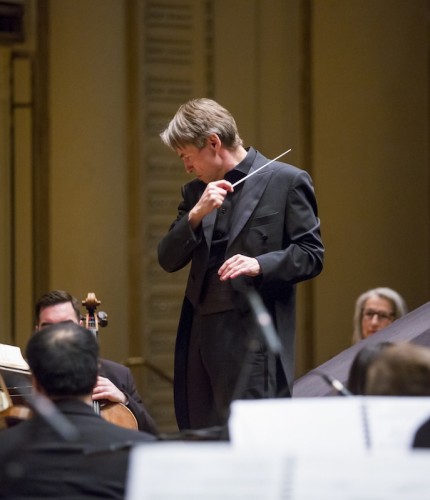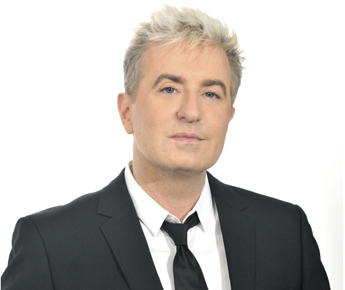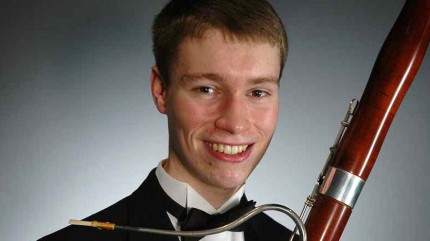CSO closes French festival with rafter-raising Messiaen

At about the 70-minute mark amid the swirling cacophony of Olivier Messiaen’s Turangalîla-Symphonie two bemused Chicago Symphony Orchestra violinists looked at each other and shrugged their shoulders as if to say, “Oh, what the hell.”
That pretty much mirrored my reaction to Thursday night’s performance of Messiaen’s sprawling work, which is ending the CSO’s three-week “Reveries and Passions” festival of French music. What a 180-degree turn from the allusive half-tones of Debussy’s Pelleas et Melisande last week.
Turangalîla is a true leviathan, ten movements spanning 80 minutes with four complexly developed cyclical themes, gamelan influences, and Messiaen’s religio-ecstatic rolling climaxes, all centered on manifestations of love.
Who knew love was so noisy? The score calls for Brobdingnagian forces and there were nearly a hundred musicians on stage Thursday night including 11 percussionists. There is also a prominent, tortuously difficult solo piano part, one for celesta, and ondes martenot, a theremin-like instrument. All the keyboard instruments were arrayed across the front of the stage, along with the vibraphones.
Undoubtedly there is sheer enjoyment to be had reveling in Messiaen’s sonic fury—the boisterous brass assaults and thundering percussion Thursday delivered some of the most cochlea-damaging volume heard at Orchestra Hall in recent seasons. There are respites–mercifully–from the clamor as with the sixth movement, “Garden of the Sleep of Love,” which bestowed a peaceful nocturnal contentment.
Yet I confess I find Turangalîla overlong, overloud and crazily over-scored. The piece is so wildly over the top in every respect that I began to wonder if Messiaen wrote this commission for the Boston Symphony Orchestra as something of an elaborate private joke.
That said, one could hardly ask for a more full tilt, powerful performance than that delivered by the CSO under Esa-Pekka Salonen. The Finnish conductor balanced the massive forces with a transparency and pinpoint clarity that were simply astonishing. The CSO musicians—brass and percussion in particular—tackled this chaotic score with unflagging dedication and technical acumen.
One doesn’t think of Jean-Yves Thibaudet as a power pianist but the French musician brought striking muscle and staggering bravura to the keyboard role, finding poetry as well as virtuosic fire in Messiaen’s impossible demands.
The sole caveat was that the important ondes martneot part, played by Valerie Hartmann-Claverie, was frequently inaudible in the back rows of the lower balcony
In a bit of whimsical programming by Salonen, the concert that ended with a virtual army of musicians began with a solo figure on a darkened stage—flutist Samuel Coles performing Debussy’s Syrinx. Principal of Salonen’s (London) Philharmonia Orchestra, Coles has provided consistently inspired playing throughout the festival. His Syrinx wasn’t the most atmospheric rendition one will ever hear but the British flutist offered a fresh and unfussy reading.
Thibaudet prefaced his Messaien tour de force with a performance of Ravel’s Piano Concerto in G major. The French pianist is such a natural and assured hand in this music that his trim, lithe playing can almost seem understated in its Gallic finesse. The soloist’s cool poise in the long cantilena of the Adagio brought the music close to Satie, with a limpid, almost ironic quality.
Yet there was no lack of excitement in the outer movements, with Thibaudet delivering polished dervish energy. The tight, transparent accompaniment by Salonen and the orchestra was fully in synch with their soloist, the conductor underlining the loopy woodwinds in the closing Presto.
____________
The news broke last January, but it wasn’t until this week that the CSO made it official that Keith Buncke is the new principal bassoonist of the CSO.
The 22-year-old musician is making his debut as guest principal bassoonist at this week’s concerts and will also perform the two final programs of the season next month. He replaces David McGill, who retired last summer.
Currently principal bassoonist of the Atlanta Symphony Orchestra, Buncke was appointed to the Atlanta post at age 21 last year while still a student at Curtis.
Buncke will officially take up his CSO post in July.
Posted in Performances




Posted May 23, 2015 at 3:58 pm by Daniel Cohn
Lawrence Rapchak in his pre concert lecture said that he was still beside himself from the following night’s performance of the Turangalia Symphonie. As an advocate for overlooked composers and masterworks, he had been in ecstacy in hearing this work performed live, providing an overload of sensation. I had heard recordings of it but had never heard it played live. I think it emphasizes sensation rather than emotion as in more conventional, especially romantic works.
What it lacks in musical depth and substance it makes up for in the unique sound world created by Messiaen, which is unmistakably his own. I don’t entirely accept Messaien’s descriptions and explanations, because to me this is abstract music. It was a once-in-a-lifetime experience. As one audience member said afterward, one of the most impressive things he has heard in a long time. Another person said it was “long and loud,” fitting for modern times.